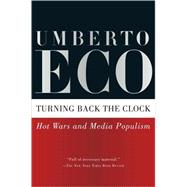
| Steps Back | p. 1 |
| War, Peace, and Other Matters Some Reflections on War and Peace | p. 9 |
| Love America and March for Peace | p. 31 |
| The Prospects for Europe | p. 37 |
| The Wolf and the Lamb: The Rhetoric of Oppression | p. 44 |
| Enlightenment and Common Sense | p. 66 |
| From Play to Carnival | p. 71 |
| The Loss of Privacy | p. 77 |
| On Political Correctness | p. 89 |
| On Private Schools | p. 97 |
| Science, Technology, and Magic | p. 103 |
| Chronicles of a Regime For Whom the Bell Tolls: A 2001 Appeal for a Moral Referendum | p. 115 |
| The 2001 Electoral Campaign and Veteran Communist Strategy | p. 121 |
| On Mass Media Populism | p. 128 |
| Foreigners and Us | p. 157 |
| Revisiting History | p. 166 |
| The Revolt Against the Law | p. 180 |
| Pasta Cunegonda | p. 190 |
| Chronicles of the Late Empire | p. 195 |
| The Return of the Great Game Between Dr. Watson and Lawrence of Arabia | p. 201 |
| Words Are Stones | p. 214 |
| Back to the Seventies | p. 224 |
| Kamikazes and Assassins | p. 229 |
| The Return of the Crusades Holy Wars, Passion, and Religion | p. 235 |
| Negotiating in a Multiethnic Society | p. 247 |
| The Taking of Jerusalem: An Eyewitness Report | p. 253 |
| Beauty Queens, Fundamentalists, and Lepers | p. 260 |
| What Are We to Do with the Pre-Adamites? | p. 263 |
| The Summaand the Rest The Roots of Europe | p. 269 |
| The Crucifix, Its Uses and Customs | p. 272 |
| On the Soul of the Embryo | p. 277 |
| Chance and Intelligent Design | p. 281 |
| Hands off My Son! | p. 284 |
| Those Who Don’t Believe in God Believe in Everything 288 Relativism? | p. 309 |
| The Defense of the Race Are the Italians Anti-Semites? | p. 313 |
| The Plot | p. 317 |
| Some of My Best Friends | p. 320 |
| Table of Contents provided by Publisher. All Rights Reserved. |
The New copy of this book will include any supplemental materials advertised. Please check the title of the book to determine if it should include any access cards, study guides, lab manuals, CDs, etc.
The Used, Rental and eBook copies of this book are not guaranteed to include any supplemental materials. Typically, only the book itself is included. This is true even if the title states it includes any access cards, study guides, lab manuals, CDs, etc.
Excerpted from Turning Back the Clock: Hot Wars and Media Populism by Umberto Eco
All rights reserved by the original copyright owners. Excerpts are provided for display purposes only and may not be reproduced, reprinted or distributed without the written permission of the publisher.